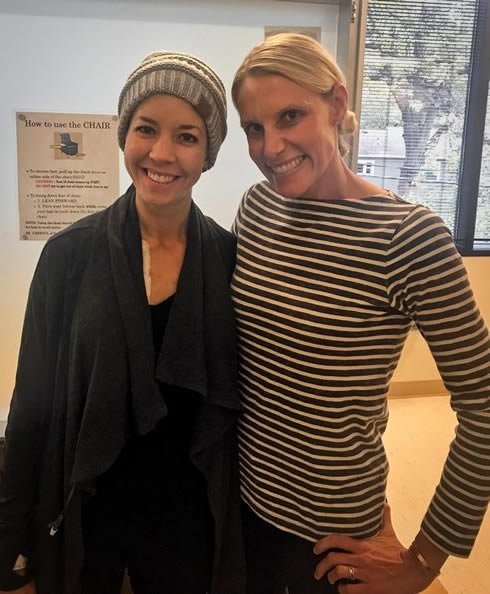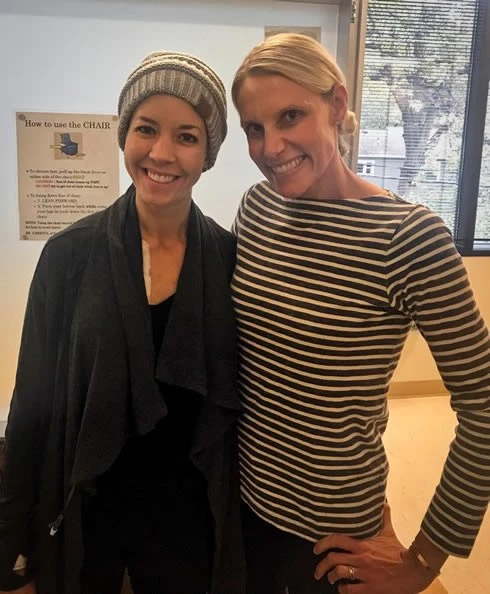To the Friends of a Cancer Fighter,
Being hit with the words “you have cancer” is an unfathomable experience. The shock, the fear, and the uncertainty settle in almost immediately as your friend starts to navigate all of the next steps. And there are a lot of them. Take it from me as a young breast cancer survivor: your friend will need you in the days ahead, but she will understand it’s hard for you to know how to respond.
It can be really scary to have a friend that is suffering. Sometimes it may be tempting to shy away from the friendship because you don’t know what to say.
Please don’t walk away.
It can be really scary to have a friend that is suffering. Sometimes it may be tempting to shy away from the friendship because you don’t know what to say, you feel terrible about what she’s going through, you just don’t know how to help, and you don’t know what the future holds for her. But, please don’t walk away. She is in a time of need. And the smallest gesture that you are able to make can be more impactful than you would imagine.
Prior to having cancer, I wouldn’t have known what to do or say. But somehow, I lucked out and had amazing friends come up beside me and walk this path with me. They have shown me what it means to be carried through the hardest of times, and that is why I can share with you now. They lived out these very words.
So, What Can You Do to Help a Friend with Breast Cancer?
- Say something. Mail the card, write the email, send the text. It doesn’t have to be long or perfect. Start with, “I’m so sorry that you are going through this, and I’m here anytime that you need me.” I’ve found it never hurts or bothers me to know that someone loves me or is thinking of me. Don’t worry about being intrusive if you use your words kindly and with compassion. Even at times when I had too many messages to respond to in the short term, it only takes a few seconds or minutes for me to read them. That means the world to someone who may be feeling alone. Don’t be concerned if you don’t get a response. The important work was done when you sent it, and the person on the other end will be thankful.
- Lend a helping hand. Sometimes we don’t even know what we need, especially in the early days of a breast cancer diagnosis. Some great options to consider: start a meal train, drop off prepared food, babysit or do carpool, pick up groceries, offer to be a point of contact that can distribute information to other friends, sit with your friend at chemotherapy treatments or if she is in the hospital.

- Give a gift. Receiving a thoughtful gift, big or small, can be all that it takes to put a smile on your friend’s face. You can ask her if there is anything that she needs, or start with some of the following gift ideas: books or magazines, a bag to take to chemo, soft shirts or pajamas, warm socks or slippers, comfortable robes, gum and mints, tea, lotion, hand sanitizer, blankets, water bottles, crossword puzzles or other games, lip balm, notebooks or journals, flowers and head coverings.
- Invite her out. Depending on the day, she may or may not feel like joining in on the activity. But, it is always nice to feel included and be a part of what is going on around her. It’s a very hard part of treatment and surgery to feel like you are missing out on the normal flow of life and just can’t get out like you did before cancer. If she is joining, find out what she would like. Maybe she is tired and her immunity is low, so a low-key evening at home may be the best. Or maybe she is ready to socialize and would love an evening out with a group of friends. At some point, she may consider attending a breast cancer conference but would prefer not to go alone.
- Ask often “How are you?” But know the answer may vary depending on the day. Some days, she may only feel like sharing “it’s fine” or “today was really tough.” Other days, she may need a listening ear for a long conversation. Because really… “ how are you?” can be a pretty loaded question. So listen. Be empathetic to her fears, be encouraging in her low times, be hopeful for her when she can’t be hopeful on her own.
- Plan a party. Now this will really be based on what you friend enjoys and wants. There can be some big milestones in the timeline of treatment. Acknowledging them in a positive way can make them more fun and celebratory. Two big events are surgery and completion of chemotherapy/radiation/treatment. You could consider a gathering before surgery to shower her with items that she may need. Fill her up with plenty of encouragement, distract from the fears, and provide her some fun memories to look back on when recovery is tough. Also, the end of cancer treatment is hard fought physically, mentally, and emotionally. Recognize and celebrate all that your friend has accomplished.
Co-survivors, we're here for you
You are a co-survivor if you offer the crucial emotional, physical, financial, or spiritual support that a young adult with breast cancer needs. You have needs too, and you're not alone.
Find Support
In the end, these are all fantastic and thoughtful ideas, but what your friend really needs is just a friend. So be there for her. And make sure to do that in a way that works for the two of you. There is nothing as comforting as knowing that you aren’t alone and someone is in your court, no matter what lies ahead of you.
From a well-loved cancer fighter,
Marisa
 Marisa is a physician, mom of three, and breast cancer fighter. She was diagnosed with early stage, triple positive breast cancer at the age of 35, which has given her a new passion for research and advocacy. She enjoys using her medical and research knowledge along with her personal experiences with cancer to make a positive impact in the oncology world.
Marisa is a physician, mom of three, and breast cancer fighter. She was diagnosed with early stage, triple positive breast cancer at the age of 35, which has given her a new passion for research and advocacy. She enjoys using her medical and research knowledge along with her personal experiences with cancer to make a positive impact in the oncology world.




